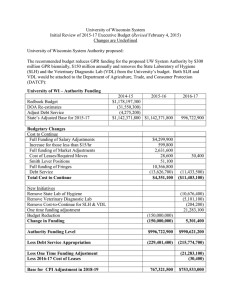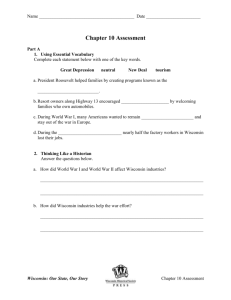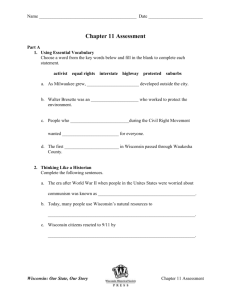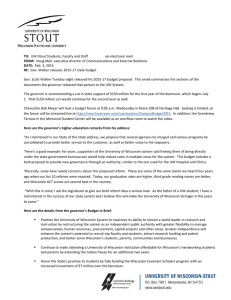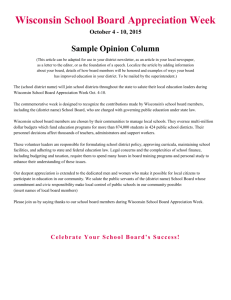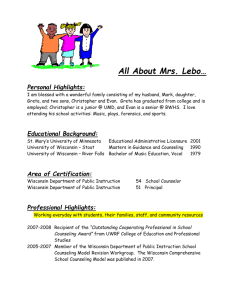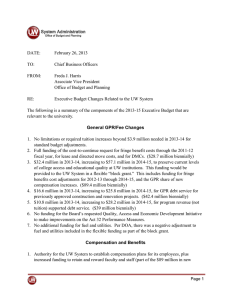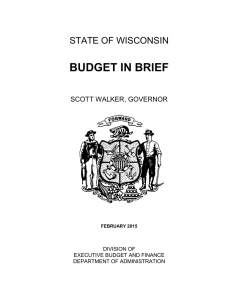University of Wisconsin System University of Wisconsin System Authority proposed:
advertisement
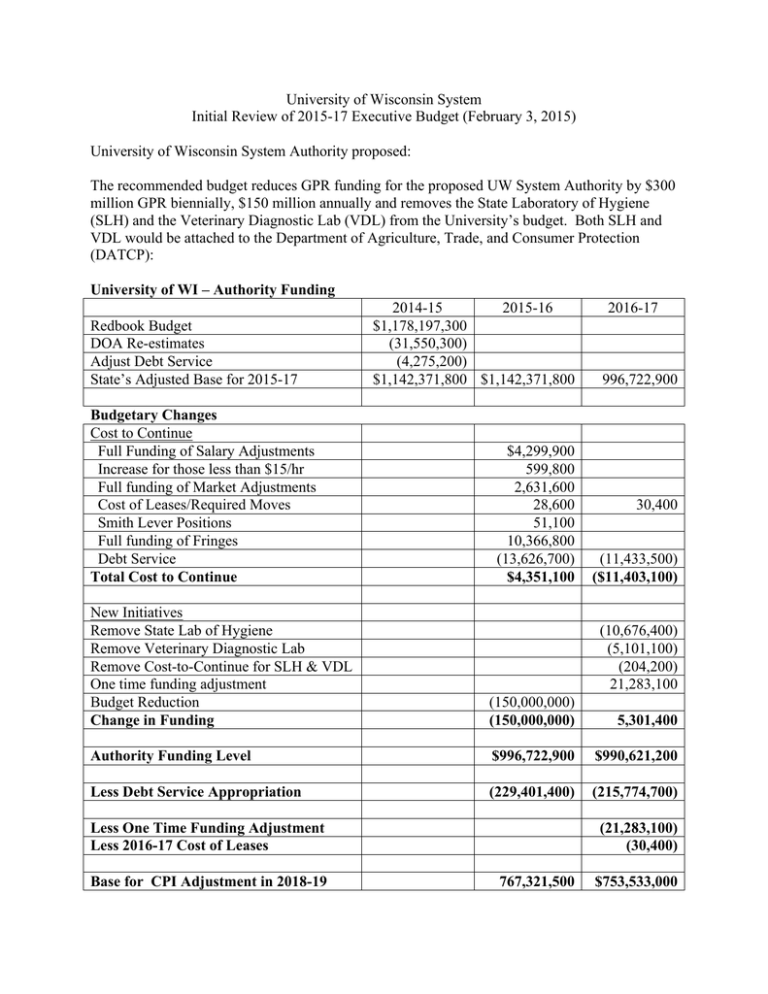
University of Wisconsin System Initial Review of 2015-17 Executive Budget (February 3, 2015) University of Wisconsin System Authority proposed: The recommended budget reduces GPR funding for the proposed UW System Authority by $300 million GPR biennially, $150 million annually and removes the State Laboratory of Hygiene (SLH) and the Veterinary Diagnostic Lab (VDL) from the University’s budget. Both SLH and VDL would be attached to the Department of Agriculture, Trade, and Consumer Protection (DATCP): University of WI – Authority Funding Redbook Budget DOA Re-estimates Adjust Debt Service State’s Adjusted Base for 2015-17 Budgetary Changes Cost to Continue Full Funding of Salary Adjustments Increase for those less than $15/hr Full funding of Market Adjustments Cost of Leases/Required Moves Smith Lever Positions Full funding of Fringes Debt Service Total Cost to Continue 2014-15 2015-16 $1,178,197,300 (31,550,300) (4,275,200) $1,142,371,800 $1,142,371,800 $4,299,900 599,800 2,631,600 28,600 51,100 10,366,800 (13,626,700) $4,351,100 2016-17 996,722,900 30,400 (11,433,500) ($11,403,100) New Initiatives Remove State Lab of Hygiene Remove Veterinary Diagnostic Lab Remove Cost-to-Continue for SLH & VDL One time funding adjustment Budget Reduction Change in Funding (150,000,000) (150,000,000) 5,301,400 Authority Funding Level $996,722,900 $990,621,200 Less Debt Service Appropriation (229,401,400) (215,774,700) (10,676,400) (5,101,100) (204,200) 21,283,100 Less One Time Funding Adjustment Less 2016-17 Cost of Leases Base for CPI Adjustment in 2018-19 (21,283,100) (30,400) 767,321,500 $753,533,000 Major Changes under the Proposed UW System Authority Governance • The budget removes most of the statutory language currently included for the UW System, while transferring existing Board policies to the UW Authority. Shared governance and tenure will need to be moved to Board policy. • The UW System Authority would no longer be required to make rules under the administrative procedures act. Tuition/Pricing • Undergraduate resident tuition would be frozen for the 2015-17 biennium. • Limitations on remission authority for nonresidents would be removed. • The Authority will be responsible for negotiating the Minnesota/WI Reciprocity Tuition Agreement for the 2016-17 fiscal year. Capital Planning/Construction. • All non-GPR projects would be exempt from enumeration. • Non-GPR projects above $760,000 require project approval by the State Building Commission. • Projects in excess of $760,000 will be bid by the Division of Facilities Development (DFD). • The Authority will manage design and construction of its projects. • The Authority may issue bonds that are not a liability of the state. • The Authority will negotiate a renewable lease with DOA to use state property for up to 75 years at a nominal fee. • Authority may purchase or lease land or buildings and sell said property. • The Authority does not have access to Building Trust Funds. Procurement, Risk Management, Printing and Fleet • Provides authority for all procurement, printing and fleet policies. The Authority may use state contracts but is not required to do so after July 1, 2016. • The Authority would remain in the state’s property and liability insurance program but could choose to opt out or in with sufficient notice. • The authority would not be included in the state’s workers compensation program. Human Resources/Personnel • Provides full authority for approving pay plan to the Board. Office of State Employment Relations (OSER) and Joint Committee on Employment Relations (JCOER) approval would not be required. • The Board would be responsible for developing and implementing a personnel structure and employment policies for the authority. • UW institutions would not receive supplemental funding from the Compensation Reserve • Employees would be considered municipal employees and covered by the Municipal Employment Relations Act (MERA). Faculty, academic staff, and university police are excluded. Budget • Authority GPR (excluding Debt Service) would be adjusted annually, beginning in 201819, by the previous calendar year’s CPI. • All program revenue and seg funded appropriations are removed from state books. • The Authority would continue to be subject to emergency budget reductions. • Position reporting and creation limitations are eliminated. • Creates two GPR appropriations for the authority (instead of five), one for General Program Operations and one for debt service. • The Authority is required to negotiate and pay for municipal services. The state currently negotiates the payments and funds the state share of these costs. • Removes the requirements, and funding, for the following programs in 2015-16 and 2016-17: o Aquaculture (2016-17) o Health Care loan assistance (2016-17) o UW Green Bay/Oneida programming (2016-17) o Environmental Education (2015-16) o Discovery Farms (2016-17) o Environmental Educations; Forestry (2016-17) o WI Bioenergy Initiative (2015-16) o Extension Recycling (2015-16) o Grants – Forestry (2016-17) o Environmental Program Grants (2016-17) o Rural Physician Residency Assistance (2016-17) o Solid Waste Research (2015-16) o Telecommunication Services (2016-17) o Wisconsin Agricultural Stewardship Initiative (2016-17) o Outdoor Skills Training (2016-17) o Studies of Great Lakes Fish (2016-17) Financial Management • Authority may deposit auxiliaries, segregated fees, gifts, grants and donations in local government Investment pool. It does not appear to provide flexibility to invest in longer term investments Other Major Changes Impacting the UW System • The Governor recommends transferring $2,484,200 for educational programming from GPR to Program Revenue in the Eduational Communications Board’s budget. • • • No change to funding in the Higher Educational Aids Board for the Wisconsin Grant for UW Students. The Governor recommends offering a $2,000 annual incentive for employees who opt out of the state health insurance program. The Governor recommends eliminating the Educational Approval Board, which is responsible for regulating private educational institutions. Consumer protections are retained by providing the Department of Agriculture, Trade and Consumer Protection • with broad authority to address complaints against both for-profit and nonprofit private institutions of higher education. The budget provides a $7 million increase to the Higher Educational Aids Board (HEAB) over the biennium to fully fund the Wisconsin Covenant Scholars program. These funds may be used by students who enroll in University of Wisconsin System Authority institutions, any Wisconsin Technical College System campus, or Wisconsin Association of Independent Colleges and Universities institutions.
